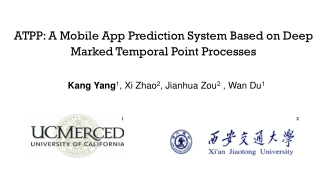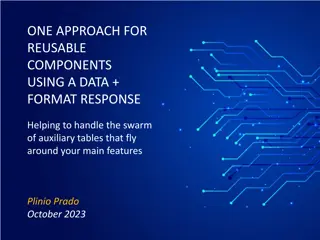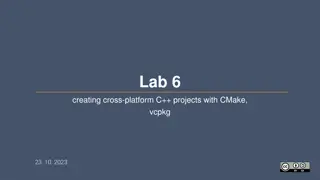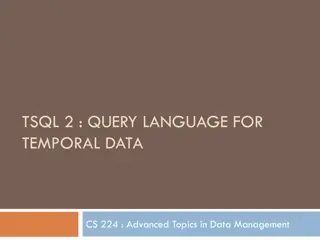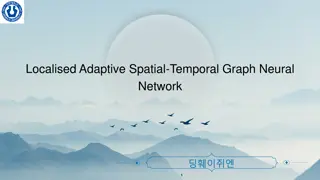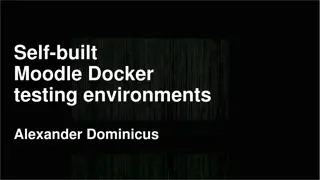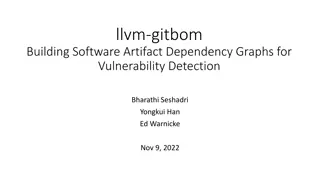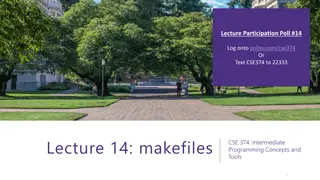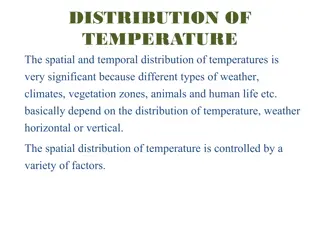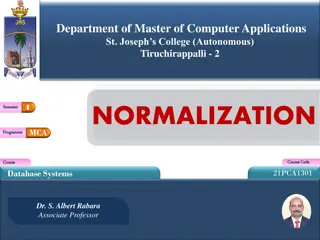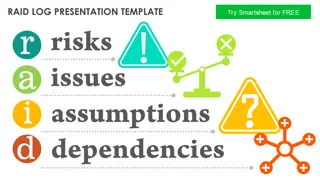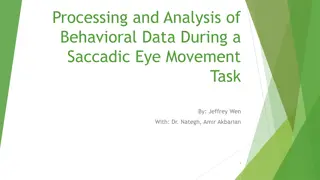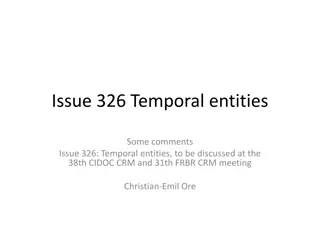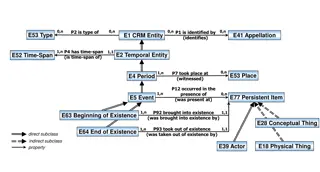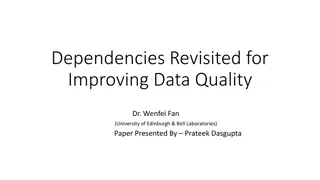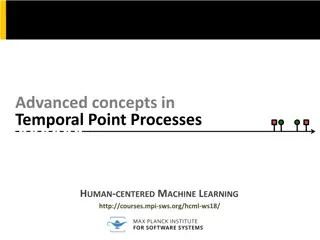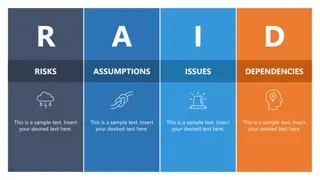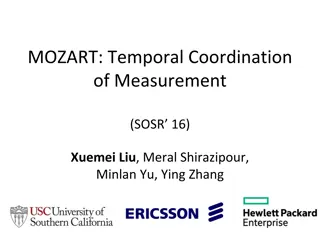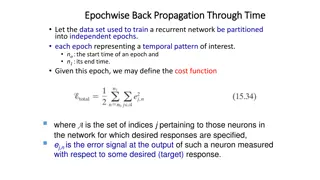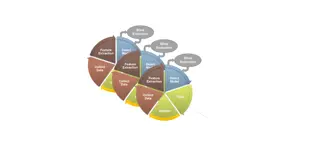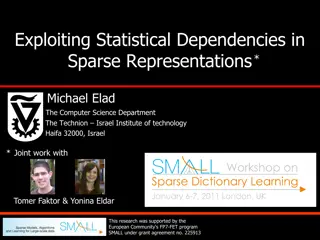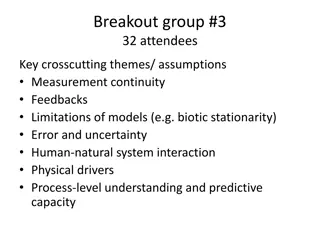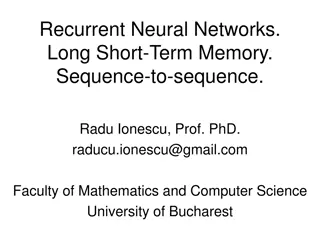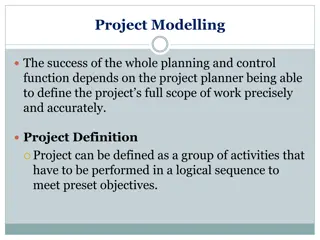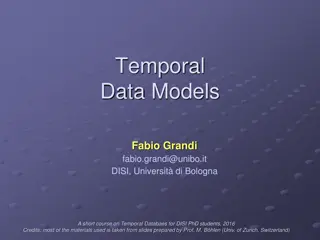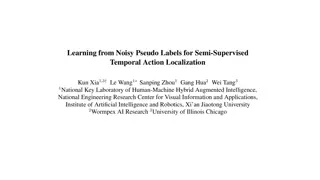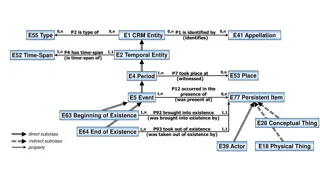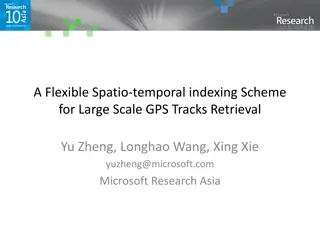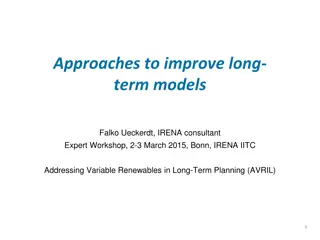Government Printing Works Ministerial Review Panel Progress Report Presentation
This presentation outlines the progress report on the Government Printing Works' implementation of the Ministerial Review Panel recommendations to the Portfolio Committee on Home Affairs. It covers the background of the incident in February 2021, challenges identified, overall progress, progress per
0 views • 49 slides
Semi-Supervised Credit Card Fraud Detection via Attribute-Driven Graph Representation
Explore a novel approach for detecting credit card fraud using a semi-supervised attribute-driven graph representation. The technique leverages temporal aggregation and attention layers to automatically unify heterogeneous categorical attributes and detect fraudulent transactions without label leaka
1 views • 23 slides
Deep Reinforcement Learning for Mobile App Prediction
This research focuses on a system, known as ATPP, based on deep marked temporal point processes, designed for predicting mobile app usage patterns. By leveraging deep reinforcement learning frameworks and context-aware modules, the system aims to predict the next app a user will open, along with its
0 views • 24 slides
Handling Auxiliary Tables in Reusable Components
Approach for managing auxiliary tables efficiently within main features using a data format response. Presentation details Plinio Prado's exploration of different alternatives and his experience in transitioning front-end to TypeScript after the project. The talk emphasizes making informed choices o
0 views • 22 slides
Cross-platform C++ Development with CMake and vcpkg
Explore the process of creating cross-platform C++ projects using CMake and vcpkg. Learn about the motivation behind build and meta-build systems, the usage of CMake for project configuration, the significance of cross-platform dependency managers like vcpkg, and how to integrate CMake with vcpkg fo
7 views • 36 slides
Understanding Input-Output Models in Economics
Input-Output models, pioneered by Wassily Leontief, depict inter-industry relationships within an economy. These models analyze the dependencies between different sectors and have been utilized for studying agricultural production distribution, economic development planning, and impact analysis of i
8 views • 7 slides
Problem Definition Sheet (PDS) Guidance and Template Overview
Providing guidance on utilizing the Problem Definition Sheet (PDS) for project clarity and success. The template outlines key questions, stakeholders, desired outputs, scope, timings, context, constraints, and risks. It emphasizes addressing a specific question, engaging relevant stakeholders, setti
5 views • 4 slides
Understanding Temporal Data Management in TSQL Queries
Explore the realm of temporal data in TSQL queries, delving into the concepts of valid time and transaction time, different types of relations like snapshot and bi-temporal, and the significance of time dimensions in database management. Learn how temporal databases support time-related queries for
6 views • 41 slides
Localised Adaptive Spatial-Temporal Graph Neural Network
This paper introduces the Localised Adaptive Spatial-Temporal Graph Neural Network model, focusing on the importance of spatial-temporal data modeling in graph structures. The challenges of balancing spatial and temporal dependencies for accurate inference are addressed, along with the use of distri
3 views • 19 slides
UAP CONFERENCE AT KAMPALA
The UAP Conference at Kampala focused on the challenges, opportunities, and recommendations for regulating alcohol consumption at all levels. The presentation highlighted issues such as cultural norms, health impacts, economic consequences, and societal behaviors associated with alcohol. Challenges
0 views • 22 slides
Understanding Ecosystems: Ecological Interactions and Dependencies
Ecology is the study of how organisms interact with their environment, influencing their distribution and abundance. This exploration covers terrestrial and aquatic biomes, energy flow, environmental impacts, adaptations, and global ecosystems, emphasizing the interconnectedness of all living organi
2 views • 58 slides
Guide to Self-built Moodle Docker Testing Environments by Alexander Dominicus
Dive into the world of self-built Moodle Docker testing environments with insights shared by Alexander Dominicus. Understand the significance of Docker containers in ensuring software portability, encapsulating dependencies, and resolving bugs. Explore the choice between pre-built and self-built set
2 views • 24 slides
Leveraging Artifact Dependency Graphs for Software Vulnerability Detection
Explore how LLVM-GitBOM utilizes artifact dependency graphs to detect vulnerabilities in software dependencies. The presentation covers the overview of GitBOM, CVE detection, supply chain vulnerabilities, and the importance of precise build tools in vulnerability scanning. Learn about utilizing gito
0 views • 34 slides
Understanding Makefiles in Intermediate Programming
Makefiles are essential for automating the build process in programming projects by defining rules for building target files based on dependencies. By organizing commands and dependencies in a structured manner, Makefiles simplify the build process, reduce errors, and save time. This article covers
0 views • 18 slides
Understanding the Spatial and Temporal Distribution of Temperature
The spatial and temporal distribution of temperatures plays a crucial role in determining weather patterns, climates, vegetation zones, and wildlife habitats. Factors such as latitude, altitude, distance from the coast, and prevailing winds influence the distribution of temperature both horizontally
2 views • 5 slides
Understanding Database Normalization and Functional Dependencies
Database normalization is a crucial process that aims to improve database design by organizing data into higher forms of normality. This helps in reducing redundancy and ensuring data integrity. Functional dependencies play a key role in defining relationships between attributes in a database. By un
0 views • 33 slides
Comprehensive RAID Log Presentation and Management Overview
This comprehensive presentation template provides a detailed overview of a RAID log, including risks, issues, threats, assumptions, dependencies, and reliance factors. It offers insights on tracking and managing different aspects of project planning and execution, categorized by risk levels. The bre
0 views • 6 slides
Behavioral Data Analysis During Saccadic Eye Movement Task
Visual systems utilize saccades to focus on objects, impacting temporal perception. This study explores the effects of saccades and stimulus location on perceived time, presenting findings from an experiment on temporal perception mapping with fixed visual duration. The method of psychometric functi
0 views • 12 slides
Discussion on Temporal Entities and Simultaneity in CIDOC CRM Meeting
Temporal entities and the modeling of simultaneity in CIDOC CRM are under discussion at the upcoming meeting. The current approach considers the cardinality of certain relations, aiming to streamline the representation of time-spans and spacetime volumes. The evolving perspectives on the spatial com
3 views • 5 slides
Understanding Temporal and Spatial Information Models
This content delves into the intricacies of temporal and spatial information models, covering concepts such as existence, presence, and spatiotemporal relationships. It explores how entities are identified, events are witnessed, and durations are defined within these models. The interplay between ti
3 views • 9 slides
Understanding the Impact of Dirty Data on Quality Improvement
Real-world data often contains errors and inconsistencies, leading to significant costs for businesses. Research activities focus on error correction, object identification, profiling, and data integration to enhance data quality. A principled approach based on data dependencies offers a promising s
0 views • 53 slides
Understanding Advanced Concepts in Temporal Point Processes for Human-Centered Machine Learning
Explore advanced concepts in temporal point processes through the lens of human-centered machine learning. Topics include marked temporal point processes, independent identically distributed marks, dependent marks, and mutually exciting marks. Learn about stochastic dynamical systems such as the Sus
0 views • 8 slides
Comprehensive RAID Log Presentation Template
This comprehensive presentation template includes a RAID log with risks, assumptions, issues, and dependencies structured in a professional layout. Utilize this template to effectively manage project risks and dependencies. The template also features a simple RAID log slide template for a clear over
0 views • 7 slides
Temporal Coordination of Measurement in Data Centers
Measurement plays a crucial role in data centers for fault diagnosis, traffic engineering, and attack detection. This study focuses on the concept of temporal coordination of measurement to overcome issues like reporting overhead and resource wastage. Various examples illustrate the importance of co
0 views • 29 slides
Exploring the Paradoxes of Time Travel
Delve into the intriguing concepts surrounding temporal parts, paradoxes of time travel, the relationship between time and change, the impossibility of changing the past, and the arguments presented by David Lewis on the logical constraints of time travel. Discover the complexities of time perceptio
0 views • 33 slides
Understanding Data Dependencies in Nested Loops
Studying data dependencies in nested loops is crucial for optimizing code performance. The analysis involves assessing dependencies across loop iterations, iteration numbers, iteration vectors, and loop nests. Dependencies in loop nests are determined by iteration vectors, memory accesses, and write
0 views • 15 slides
Epochwise Back Propagation Through Time for Recurrent Networks
In the context of training recurrent networks, Epochwise Back Propagation Through Time involves dividing the data set into independent epochs, each representing a specific temporal pattern of interest. The start time of each epoch, denoted by 'no', is crucial for capturing the sequential dependencie
0 views • 28 slides
Analysis of Deep Learning Models for EEG Data Processing
This content delves into the application of deep learning models, such as Sequential Modeler, Feature Extraction, and Discriminator, for processing EEG data from the TUH EEG Corpus. The architecture involves various layers like Convolution, Max Pooling, ReLU activation, and Dropout. It explores temp
0 views • 15 slides
Statistical Dependencies in Sparse Representations: Exploitation & Applications
Explore how to exploit statistical dependencies in sparse representations through joint work by Michael Elad, Tomer Faktor, and Yonina Eldar. The research delves into practical pursuit algorithms using the Boltzmann Machine, highlighting motivations, basics, and practical steps for adaptive recovery
0 views • 47 slides
Understanding UML Package Diagrams and Components in Software Design
UML package diagrams are essential in organizing model elements such as use cases and classes into groups for a better structure in system modeling. They help in providing a high-level overview of requirements and architecture, logically modularizing complex diagrams, and indicating dependencies bet
0 views • 38 slides
Understanding Temporal Variability of Ecosystem Processes across Land and Ocean
This content delves into the broad-scale and cross-scale ecosystem processes on land and in the ocean, exploring their temporal variations influenced by underlying structures, biodiversity, and climate. It emphasizes the importance of considering structure, function, and climate response simultaneou
1 views • 9 slides
Examining Reparations for Historic Enslavement: Inter-temporal Challenges
The Law & Race Speaker Series on applying past laws to ongoing wrongs explores the complexities of seeking reparations for historic enslavement. The discussion delves into the inter-temporal considerations, touching on reparation claims by CARICOM, the impact of transatlantic chattel slavery on glob
0 views • 27 slides
Understanding Recurrent Neural Networks: Fundamentals and Applications
Explore the realm of Recurrent Neural Networks (RNNs), including Long Short-Term Memory (LSTM) models and sequence-to-sequence architectures. Delve into backpropagation through time, vanishing/exploding gradients, and the importance of modeling sequences for various applications. Discover why RNNs o
0 views • 102 slides
Exploring Project Modelling and Work Breakdown Structures
In project management, precise project definition is crucial for successful planning and control. Project modelling involves utilizing tools like Work Breakdown Structure (WBS) to efficiently define project scopes and hierarchies. By breaking down the project into smaller elements of work, WBS aids
0 views • 37 slides
Overview of Temporal Data Models and Time Dimensions in Databases
Explore the concepts of temporal data models and time dimensions in databases, covering topics such as data structures, query languages, different timestamp types, valid time, and transaction time. Learn about the importance of supporting various time aspects in database systems and the complexities
0 views • 52 slides
Loop Invariant Code Motion in Frequent Paths for Optimization
Loop Invariant Code Motion (LICM) is a key optimization technique that identifies and moves code operations whose operands remain constant within a loop to improve performance. The process involves careful consideration of memory operations and operations not executed every iteration. The assignment
0 views • 20 slides
Handling Label Noise in Semi-Supervised Temporal Action Localization
The Abstract Semi-Supervised Temporal Action Localization (SS-TAL) framework aims to enhance the generalization capability of action detectors using large-scale unlabeled videos. Despite recent progress, a significant challenge persists due to noisy pseudo-labels hindering efficient learning from ab
0 views • 30 slides
Understanding Spacetime Volume and Temporal Information
Explore the definitions, relationships, and properties of spacetime volume, temporal information, and their components like time spans and entities. Learn about how events are witnessed and defined within specific spatiotemporal contexts.
0 views • 9 slides
Flexible Spatio-temporal Indexing Scheme for Large Scale GPS Tracks Retrieval
This research paper discusses a novel spatio-temporal indexing scheme optimized for managing large-scale GPS data. The study introduces a stochastic process model to simulate user behavior in uploading GPS tracks, leading to a more efficient indexing scheme with smaller size, minimal update efforts,
0 views • 24 slides
Enhancing Long-Term Energy Models for Variable Renewables
Explore approaches to enhance long-term energy models for integrating variable renewables in long-term planning. Key aspects include improving generation networks, ensuring sufficient capacity and reliability, flexibility, robustness to contingencies, and security considerations. Temporal matching o
0 views • 22 slides


